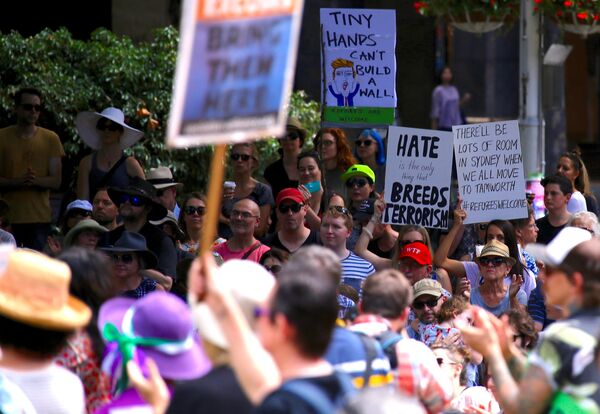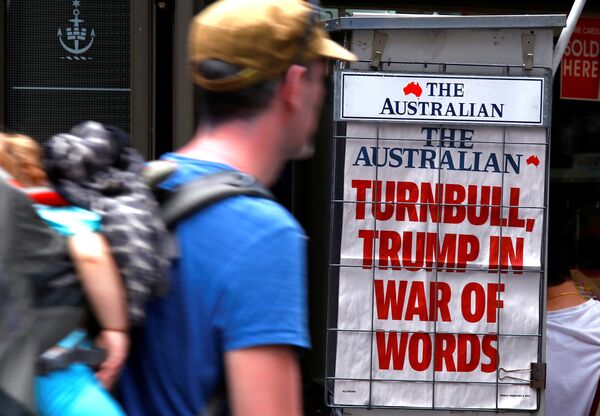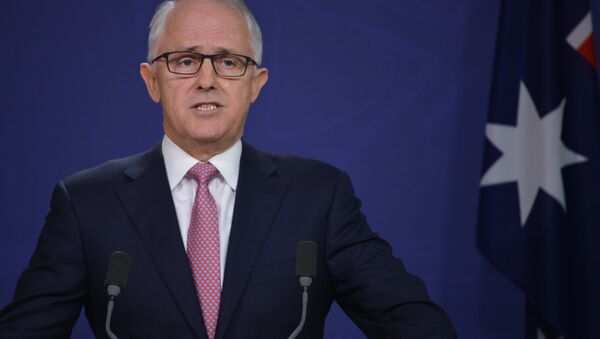On Friday, February 11, Prime Minister Turnbull may breathe a sigh of relief, grateful for a politics-free weekend, after enduring a hellacious fortnight. On January 31, he announced he'd struck a deal with US President Donald Trump to exempt Australian citizens from travel restrictions — before it emerged no such deal existed, and Australians were subject to the same immigration rules as any other Western nation.
Then, the "refugee swap" deal he agreed in 2016 with then-President Barack Obama, which would see Manus and Nauru island refugees resettled in the US, was slammed by President Trump and canceled.
Do you believe it? The Obama Administration agreed to take thousands of illegal immigrants from Australia. Why? I will study this dumb deal!
— Donald J. Trump (@realDonaldTrump) February 2, 2017
Mr. Turnbull rushed to salvage the deal in a telephone call with President Trump, at the conclusion of which the premier reassured Australians the agreement had been successfully rescued. Anonymous White House sources responded by briefing mainstream US media outlets that the call was "by far the worst" President Trump had had with a foreign leader since taking office. In it, President Trump was alleged to have said he thought the deal was "the worst ever" and amounted to "terrorist exportation," before abruptly ending the conversation halfway through its allotted runtime.

The confused fracas pushed Mr. Turnbull's already low approval ratings even lower — although, as if that embarrassing cavalcade wasn't sufficiently savage, as of February 7, Prime Minister Turnbull's very government hangs in the balance. Senator Cory Bernardi quit the administration to form a new political party, the Australian Conservatives.
Emulating the populist rhetoric of Donald Trump's Presidential campaign, Senator Bernardi said Australian voters needed "another way," and that the party would stand on a platform of "lower taxes, better outcomes for families, fostering enterprise, restricting the scope of government and building society."
Senator @corybernardi launched Australian Conservatives in @AuSenate. Text of speech at 12:40pm on his blog https://t.co/y6EBqoMNTQ #auspol
— Aust Conservatives (@AuConservatives) February 7, 2017
Michael Dutton, a professor of politics at Goldsmiths University, says Bernardi isn't the only Australian politician riding to prominence on a wave of mainstream disillusionment.
Ten years ago, when Mr. Dutton resided in Australia, the One Nation party was regarded as extremist — now, he says it's "legitimate and mainstream."
"Mainstream parties the world over are struggling to come to terms with voter discontent, and Australia is no different. There, the gap between parties has narrowed significantly in recent years — both the Liberals and Labour adhere to similar models of globalization and economic organization, which don't take into account the problems of people losing jobs, or being reemployed in jobs they feel are beneath them. Getting back from that requires root and branch re-examination of the way parties are going," Professor Dutton told Sputnik.
For Mr. Dutton, Australian politics has long failed to take into account complaints emerging from extremes, and these concerns have now been picked up by the far-right in a populist way, their untapped energy, mobilized by politicians such as Senator Bernardi.

He added that while this trend has been burgeoning for a number of years, and was at first capitalized upon by left-wing movements such as Podemos in Spain and Syriza in Greece, the mood has now been completely hijacked by the right.
"People haven't felt strongly about politics for years — they've been alienated from the political system, and in turn, marginalized it themselves. As governments have shrunk, so has interest in politics. However, now that alienation has translated into disenchantment," he concluded.
Mr. Bernardi claims over 50,000 have already signed up to the party online, and he will be looking for more recruits on Australia's parliamentary benches. If he's successful, Prime Minister Turnbull could well be in trouble — just one more defection will leave his government in minority territory.


